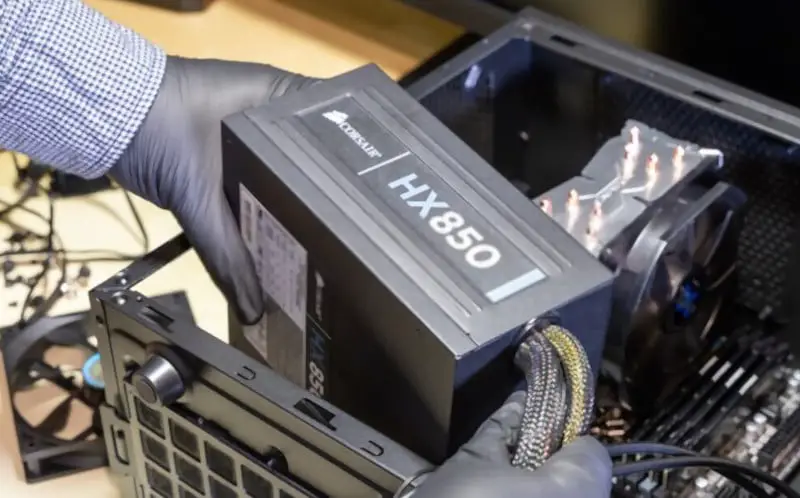A power supply (PSU) is one of the most important components of your computer. It is responsible for supplying electricity to all of the parts that need it. This includes everything from your CPU, motherboard, graphics card, hard drives, and RAM.
The quality of these power supplies can vary greatly, so when you are shopping for a new one there are several factors you want to take into consideration.
When it comes to power supplies, the two most popular brands are Corsair and Evga. These two companies offer a wide range of power supply units that can be used for both gaming PCs and high-end workstations.
In this article, we’ll take a look at the differences between these two PSU brands and then lay out some guidelines that will help you decide how to proceed on your own.
Watts vs Price
You should find the right balance between the power supply and cost. You may spend several hundred dollars for the best PSU. Fortunately, your PC needs lower power as high-end power might be overkill for your device.
For instance, a 550W power supply might be plenty for PC’s productivity and gaming. You can know the appropriate watts and amount by calculating the right wattage using a calculator. An OuterVision Power Supply Calculator can simplify watts calculation as it provides some wiggle room that considers all the minor changes to the system in the future.
Use the basic button on the calculator and enter the PC’s build. The calculator will determine the wattage based on the build.
It would be best to choose an efficient PSU that does not waste such power in the form of heat, as they have a big impact on a PC. If the PC overheats, it could need more power to run the fan, which expels the hot air, creating more noise and stability issues.
You might need more power to run the PC’s components. Even so, the power bill would depend on how frequently you use your PC; for instance, if your PC runs 24/7, it would impact your power bill.
Non-Modular, Semi-Modular, And Fully Modular PSU For Heavy Users
Modular refers to the number of cables used to connect the PSU with a computer, and the cabling you choose would depend on your budget and how much you would spend.
Non-Modular
The non-modular supplies power through a bundle of cables that are hardwired to the device generating power. The cabling saves money; thus, most PCs use non-modular cabling. However, the cables that are not used remain inside the PC and use a lot of space.
Additionally, the extra cables might affect the airflow to the fan leading to overheating. Moreover, the cables are in a bundle with a fixed length. You may need to disconnect every component to remove the PSU.
Semi-Modular
The semi-modular cabling is costlier and would cost about $10 or more than the non-modular cables, which is a small difference and offers a massive difference in PC cable management. It reduces the use of cables in your PC, which creates more space for proper airflow.
When you look at the Corsair vs. Evga PSU comparison for the semi-modular PSU, both companies have the same output.
Fully Modular
The fully modular is high-end and more expensive and practical for your PC. The fully modular depends on the individual needs.
Comparison of the Corsair vs. Evga PSU
Both the power supply models are effective and are suitable for your PC. However, you may consider issues such as cable connection and the cost of the PSU. Your power supply should maintain a constant power supply while ensuring the power does not damage your device
| Corsair PSU | Evga PSU |
|---|---|
It has semi-modular cabling, which has a 12v ATX cable hardwired PC. | It has fully modular, which has no hardwired cable connected to the ATX cable. It is possible to change the ATX cable with short and costumed sleeved cables, which helps route SATA drives. |
It does not have an eco-mode. | It features an eco-mode offered by Evga, and you can switch off the, which makes it possible for the device to function silently. |
It is cheaper as it has fewer features. | It is more costly due to the eco-mode. |
It sells for about $100; thus, you would save money with this model. | It is a bit expensive but has a little price difference and offers the best value. |
Advantages of Corsair

Unlike other power supply systems, Corsair does not have a PFC/PWM controller on the primary and secondary integrated circuits. A digital signal processor replaces the PFC. It uses the ‘resonant mode,’ a super-efficient power that switches from analog signals to digital.
The ability to switch between both PSU models makes the power supply more efficient and offers a wider range of loads than other PSU power supplies. However, the frequencies might affect the voltage regulation and lead to ripple and noise, which affect the PC.
It supplies safety functions like over current protection (OCP) for your PC, thus protecting it from output drawing too much current from your device. Over-power protection prevents overloading and offers under-voltage protection.
The power supply protects from high temperatures preventing PC damage. It instructs the PC to shut down the power supply preventing heat damage on your device.
The power source improves the voltage regulations, which prevents drops in voltage as loads increase. It prevents a drop in voltage as loads increase. The information about the power supply output is available on the PMW controller on the analog signal, but it is slow and would vary from one computer to another.
Thus for this power source, the voltage regulation might not be as effective as it can be.
The Corsair Link monitors the AC input voltage and wattage. It controls the current delivered on each graphic card PCIe and would turn down all the limits to 20A. It would keep track of the speed of the fan and how it affects the PC’s cooling.
It is much better than the average desktop PSU on so many levels. It utilizes the DSP offering improved efficiency while marinating the voltage and minimizing unwanted ripple and noise. The output is maintained on the Corsair Link digital format.
Advantages of Evga

Evga offers 80 PLUS performance specifications as the PCs need 80% or greater energy with a true power factor of 0.9 or greater. The power supply by the Evga thus provides substantial energy to power your PC. The Evga power supply is categorized into different tiers.
For instance, the Titanium tier is the pinnacle of efficiency with a PFC of 0.95 @ 50% and a standard 115v. It offers clean components which reduce the heat overall and provides excellent savings to the electric bill. The Evga Titanium model offers an eco-thermal control system, and the fan might not spin when not needed.
Since the model does not allow the fan to run when not needed, it reduces the noise and the heat generated is minimum due to higher efficiency.
The platinum Evga models are standard PSU, and they offer high-end performance and efficiency. It has up to 92% efficiency with the typical load, thus reducing heat and lowers total consumed power. It reduces your monthly bill due to energy efficiency.
The gold-plus Evga models are above average, and it has both the high quality and low-quality PSUs. The high-quality models ensure the system is powerful and efficient; the lower quality models are effective but might not offer the power output you would need.
Although the heat from the Evga models would affect the system no matter how effective it is, the power PSUs are effective and emit less heat exchange. It prevents the PC’s motherboard from overheating, which is common with other power sources.
The heat is the biggest issue with the PC system, and it would be wise to have an effective cooling system, and it would be wise to get certified power supplies.
The Evga PSUs have intelligent automatic fans which work well with or without software. The Evga power supply does its job automatically and controls the power supply to your system, thus preventing excess power supply.
It has an intelligent fan speed control which increases RPM only when required. It also reduces heat when needed and keeps efficiency at its max, which controls the cooling system, improving the other components’ functioning.
The eco-thermal control offers silent operation at low to mid-range loads, increasing the fan’s life span. It reduces ambient noise and energy costs for the operation when needed. The fans are fitted with an optional feature that stops the noise when working on low to mid-range load applications. This feature toggles directly the power supply providing a convenient cooling environment for the PC.
The models provide adequate constant power for your PC and can last a long time at maximum ratings. For instance, if you purchase a 1000W Evga power supply, you will get a 1000W peak-rated power supply. Most models would support the maximum 1000W for a few minutes.
It supports constant power, avoids system crashing or stability, and prevents power shortage, resulting in under-powering of the components. It causes less harm to the power supply as it avoids running the risk of shutting.
However, although it hits maximum wattage, it is only sustainable for a short time, lasting only a few seconds. Reaching the maximum power may cause the power to be short-lived, thus reducing the overall usage which reduces the overall usage.
How to Choose Between Corsair and Evga Models
Although it is possible to misunderstand or overlook the PC power supply, it could be better to understand how to choose the best power source and its impact on the other components. You may not rely only on the total wattage as power supply ability is important.
Other issues that might differ from one PSU to another include the SSDs and graphic cards. Manufacturers can overstate the features, and it could be wise to go for reliable brands such as Corsair or Evga PSU.
When buying either of the brands, it could be wise to go for a trusted vendor who sells genuine products. The product review could save you from fraudulent PSU manufacturers. Cheap and generic power supplies tend to be substandard, and it is best to look for reputable brands which give solid warranties and support. Both Corsair and Evga PSU offer highly reputable products.
Heavier and large units are better than the lightweight models, as they offer high-quality power, which accommodates better capacitors powering other internal components.
In addition, they have more heatsinks which dissipate the heat quickly, eliminating the need for large fans. These PSUs make less noise as the fans are smaller, and it could be wise to check if the unit is compatible with a particular PC system.
You may consider a power supply’s efficiency rating, which offers a higher-efficiency unit. It leads to better preservation of the components, wastes less power, and generates less heat, thus making it possible to maintain the computer in good condition.
Corsair or Evga: Which is Better?
Although the Corsair vs. Evga PSU comparison indicates both PSU systems are effective, I would go with Evga PSU. The system offers high power making it possible to supply constant power to your PC.
Additionally, the PSU’s power supply ratings show the Evga models won’t fail as they waste less power and generate less heat which does not harm your device. The 80 plus is effective and could meet all your PC power needs.
Conclusion
The PSU is an important feature for your device as it determines the reliability of the power supply. Although you would consider other PC components such as graphic cards and RAM, it would be better to consider the power output and distribution to other components when choosing a PSU.
The Corsair vs. Evga PSU indicates both models are best as they meet the power needs for your device as they have an efficient power supply rating which offers a higher-efficiency unit.
It leads to better preservation of the components, wastes less power, and generates less heat, thus making it possible to maintain the computer in good condition. Good luck choosing the best PSU model for your PC.





